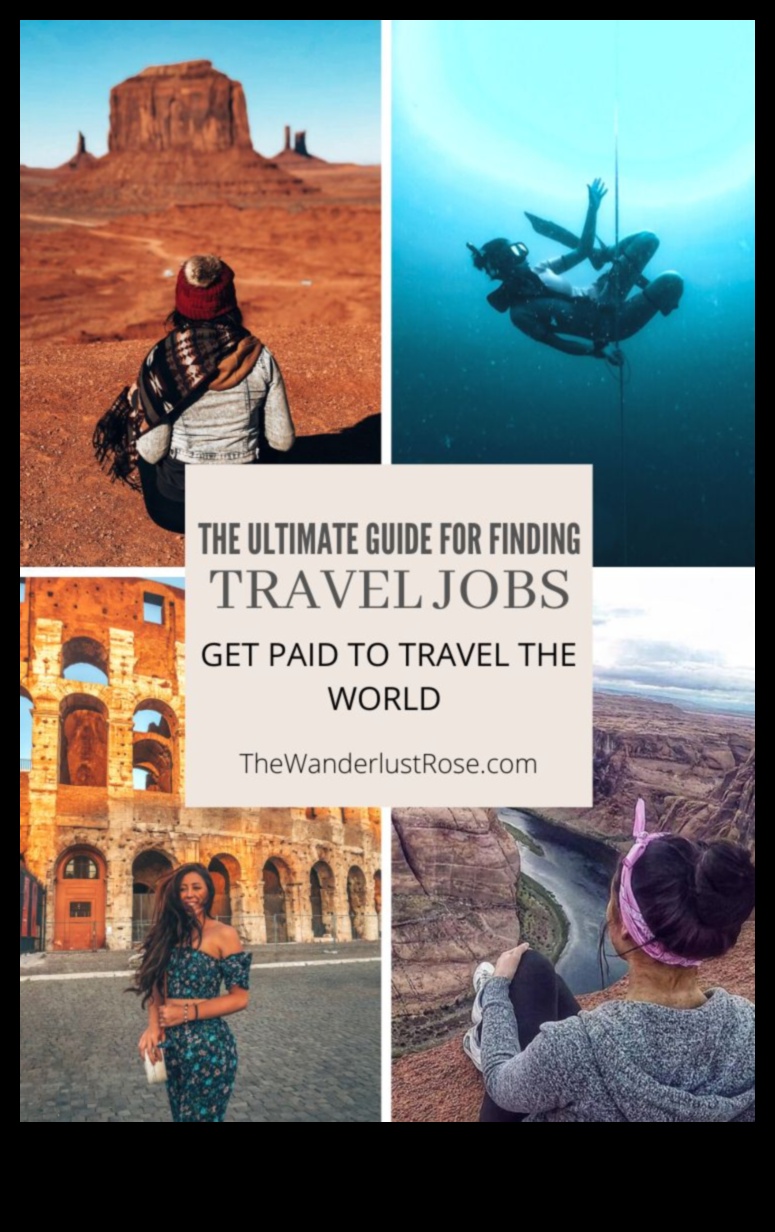
I. Introduction
II. Types of travel jobs
III. How to find travel jobs
IV. Benefits of working in travel
V. Challenges of working in travel
VI. How to prepare for a career in travel
VII. Salary and benefits for travel jobs
VIII. The future of travel jobs
IX. Conclusion
X. FAQ
| Feature | Answer |
|---|---|
| Travel jobs | Jobs in the travel industry, such as flight attendants, tour guides, or cruise ship workers. |
| Apply for travel jobs | Find travel jobs that are a good fit for you, research the requirements, and apply for jobs online or in person. |
| Travel job openings | Find travel job openings on job boards, company websites, and social media. |
| Travel job search | Use keywords related to your travel job interests, location, and experience level to find relevant job openings. |
| Travel job requirements | Depend on the specific job, but may include a college degree, experience in the travel industry, and fluency in multiple languages. |

II. Types of travel jobs
There are many different types of travel jobs available, each with its own unique set of requirements and benefits. Some of the most common types of travel jobs include:
- Flight attendant
- Tour guide
- Cruise ship worker
- Hotel manager
- Travel writer
- Travel photographer
- Remote worker
Each of these jobs offers its own unique set of benefits and challenges. For example, flight attendants get to travel the world and see new places, but they also work long hours and may be away from home for extended periods of time. Tour guides get to meet new people and learn about different cultures, but they may also have to work long hours and deal with difficult customers. Cruise ship workers get to live and work on a beautiful ship, but they may also have to work long hours and deal with seasickness. Hotel managers get to work in a glamorous setting and meet interesting people, but they also have to deal with the stress of running a hotel. Travel writers get to travel the world and write about their experiences, but they may also have to work long hours and deal with deadlines. Travel photographers get to travel the world and take pictures of amazing places, but they may also have to work long hours and deal with the challenges of shooting in different conditions. Remote workers get to work from anywhere in the world, but they may also have to deal with loneliness and isolation.
When choosing a travel job, it is important to consider your interests, skills, and personality. If you are looking for a job that allows you to travel and see the world, there are many different options available to you. You just need to find the right job that is a good fit for you.
III. How to find travel jobs
There are a number of ways to find travel jobs. Here are a few of the most popular methods:
Search online job boards. There are many online job boards that list travel jobs. Some popular job boards include Indeed, Monster, and CareerBuilder.
Network with people in the travel industry. Talk to your friends, family, and colleagues who work in the travel industry. They may know of open positions or be able to put you in touch with someone who does.
Attend travel industry events. Attending travel industry events is a great way to network with people and learn about job openings. Some popular travel industry events include the World Travel & Tourism Council (WTTC) Global Summit and the International Air Transport Association (IATA) Annual General Meeting.
Contact travel companies directly. Visit the websites of travel companies that you’re interested in working for and search for job openings. You can also contact the companies directly to inquire about job openings.
Once you’ve found a few travel jobs that you’re interested in, it’s important to tailor your resume and cover letter to each specific position. Make sure to highlight your skills and experience that are relevant to the job you’re applying for. You should also be prepared to answer questions about your travel experience and why you’re interested in working in the travel industry.

IV. Benefits of working in travel
There are many benefits to working in the travel industry. Some of the most common benefits include:
- The opportunity to travel and see the world
- A flexible work schedule
- A high level of job satisfaction
- The chance to meet new people and learn about different cultures
Of course, there are also some challenges to working in the travel industry. Some of the most common challenges include:
- Long hours
- Low pay
- Unpredictable work schedules
- The need to be away from home for extended periods of time
Ultimately, whether or not the benefits of working in the travel industry outweigh the challenges is a personal decision. However, for those who are looking for a job that allows them to travel and see the world, working in the travel industry can be a very rewarding experience.

V. Challenges of working in travel
Working in the travel industry can be a rewarding experience, but it can also be challenging. Some of the challenges of working in travel include:
- Long hours
- Unpredictable schedules
- Dealing with difficult customers
- Working in a fast-paced environment
- Being away from home for long periods of time
Despite these challenges, working in the travel industry can also be very rewarding. It can provide you with the opportunity to see the world, meet new people, and learn about different cultures. It can also be a great way to build your career and make a difference in the world.

VI. How to prepare for a career in travel
There are a number of things you can do to prepare for a career in travel. These include:
- Get a degree in a travel-related field.
- Gain experience working in the travel industry.
- Develop your language skills.
- Get certified in a travel-related field.
- Build your network of contacts in the travel industry.
Here is a more detailed look at each of these steps:
Get a degree in a travel-related field
A degree in a travel-related field can give you the knowledge and skills you need to succeed in a career in travel. Some popular travel-related degrees include:
- Tourism management
- Hospitality management
- Airline management
- Cruise ship management
- Travel writing
A degree in a travel-related field can also help you stand out from other candidates when applying for jobs in the travel industry.
Gain experience working in the travel industry
Getting experience working in the travel industry is another great way to prepare for a career in travel. There are a number of ways you can gain experience, such as:
- Working as a travel agent
- Working as a tour guide
- Working in a hotel or resort
- Working in a cruise ship
- Working in a travel-related company
Getting experience working in the travel industry can help you learn the ropes of the industry, develop your skills, and build your network of contacts.
Develop your language skills
Being able to speak multiple languages is a valuable asset in the travel industry. Many jobs in the travel industry require employees to be able to communicate with customers and clients from different countries. If you are not fluent in another language, consider taking some classes or practicing with a language tutor.
Get certified in a travel-related field
Getting certified in a travel-related field can help you improve your skills and knowledge, and make you more attractive to potential employers. Some popular travel-related certifications include:
- Certified Travel Associate (CTA)
- Certified Travel Specialist (CTS)
- Certified Travel Counselor (CTC)
- Certified Tour Guide (CTG)
- Certified Cruise Ship Director (CCSD)
Getting certified in a travel-related field can also help you stand out from other candidates when applying for jobs in the travel industry.
Build your network of contacts in the travel industry
Networking is an important part of any career, and it is especially important in the travel industry. Attend industry events, join professional organizations, and connect with people on social media. The more people you know in the travel industry, the more likely you are to hear about job openings and get your foot in the door.
By following these steps, you can prepare yourself for a successful career in travel.
VII. Salary and benefits for travel jobs
The salary and benefits for travel jobs can vary depending on the type of job, the employer, and the location. However, some general trends can be observed.
In general, travel jobs tend to pay more than other types of jobs. This is because travel jobs often require employees to have a higher level of education and experience. Additionally, travel jobs can be more demanding than other types of jobs, so employers are willing to pay more to attract qualified candidates.
The average salary for a travel job is around \$60,000 per year. However, salaries can range from \$30,000 to \$100,000 or more, depending on the factors mentioned above.
In addition to salary, travel jobs often offer a number of other benefits, such as:
- Free or discounted travel
- Housing allowances
- Health insurance
- Pension plans
- Life insurance
These benefits can make travel jobs a very attractive option for people who are looking for a job that allows them to travel and see the world.
The future of travel jobs
The travel industry is constantly changing, and the future of travel jobs is no exception. Here are some of the factors that are likely to impact the future of travel jobs:
The rise of remote work: More and more people are working remotely, which means that they can live and work anywhere in the world. This trend is likely to continue, which could lead to more opportunities for travel jobs that can be done remotely.
The growth of the gig economy: The gig economy is growing rapidly, and this is creating new opportunities for travel jobs. For example, there are now many opportunities to work as a freelance travel writer, photographer, or tour guide.
The increasing demand for sustainable travel: Consumers are increasingly demanding sustainable travel options, and this is creating new opportunities for travel jobs in the ecotourism and sustainable tourism sectors.
The development of new technologies: New technologies, such as artificial intelligence and virtual reality, are also likely to have a significant impact on the future of travel jobs. For example, AI could be used to create more personalized travel experiences, and VR could be used to offer virtual tours of destinations.
It is difficult to predict exactly what the future of travel jobs will look like, but it is clear that the industry is changing rapidly. By understanding the factors that are likely to impact the future of travel jobs, you can prepare yourself for the opportunities that lie ahead.
IX. Conclusion
In this article, we have discussed the search intent of “how to apply for travel jobs” and provided tips on how to create content that helps people find and apply for travel jobs. We have also discussed the benefits and challenges of working in travel, and provided advice on how to prepare for a career in travel.
We hope that this article has been helpful and that you are now better equipped to find and apply for travel jobs.
FAQ
Q: What are the different types of travel jobs?
A: There are many different types of travel jobs, including:
- Flight attendant
- Tour guide
- Cruise ship worker
- Hotel manager
- Travel agent
Q: What are the benefits of working in travel?
A: There are many benefits to working in travel, including:
- The opportunity to travel and see the world
- Meeting new people from different cultures
- Learning about different cultures
- Having a flexible work schedule
- Earning a good salary
Q: What are the challenges of working in travel?
A: There are some challenges to working in travel, including:
- Long hours
- Being away from home for long periods of time
- Dealing with jet lag
- Working in a fast-paced environment